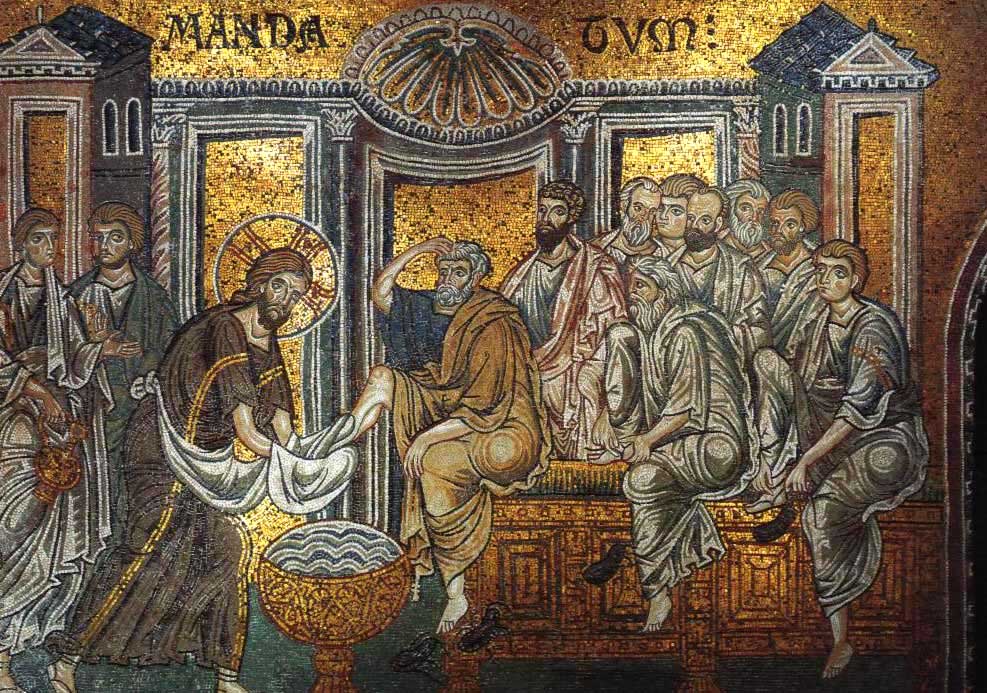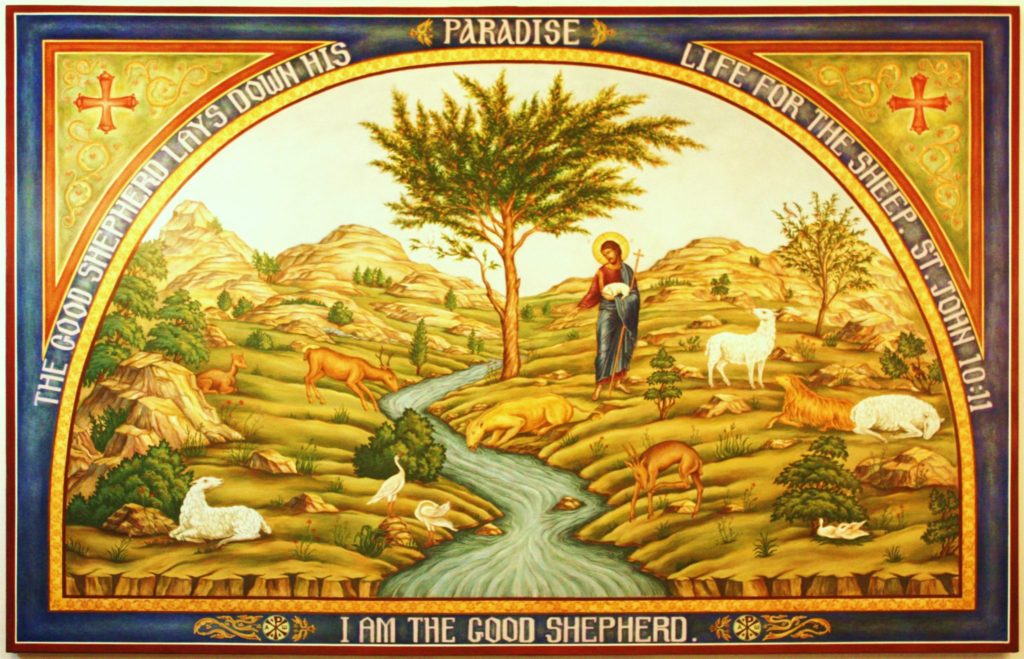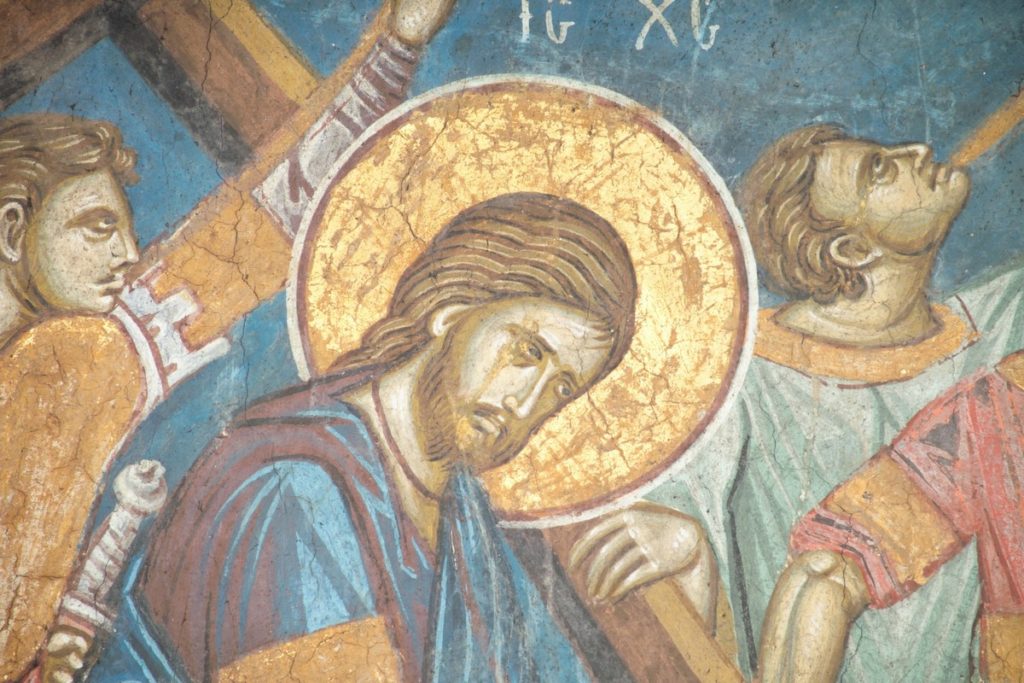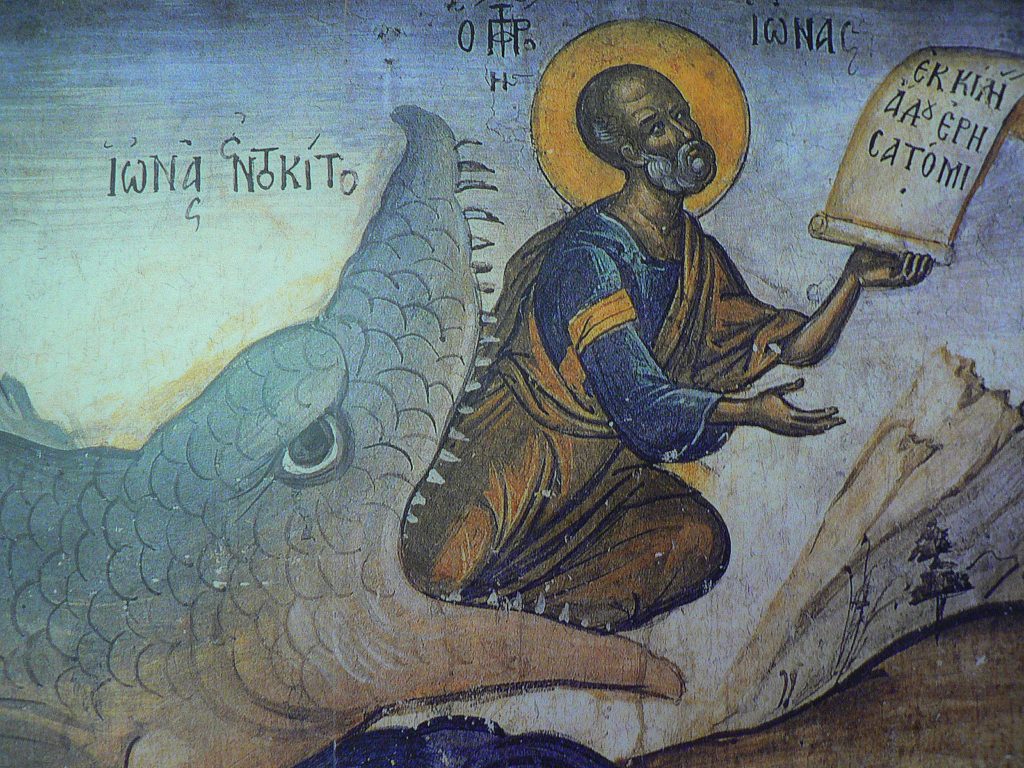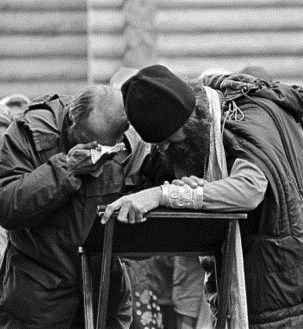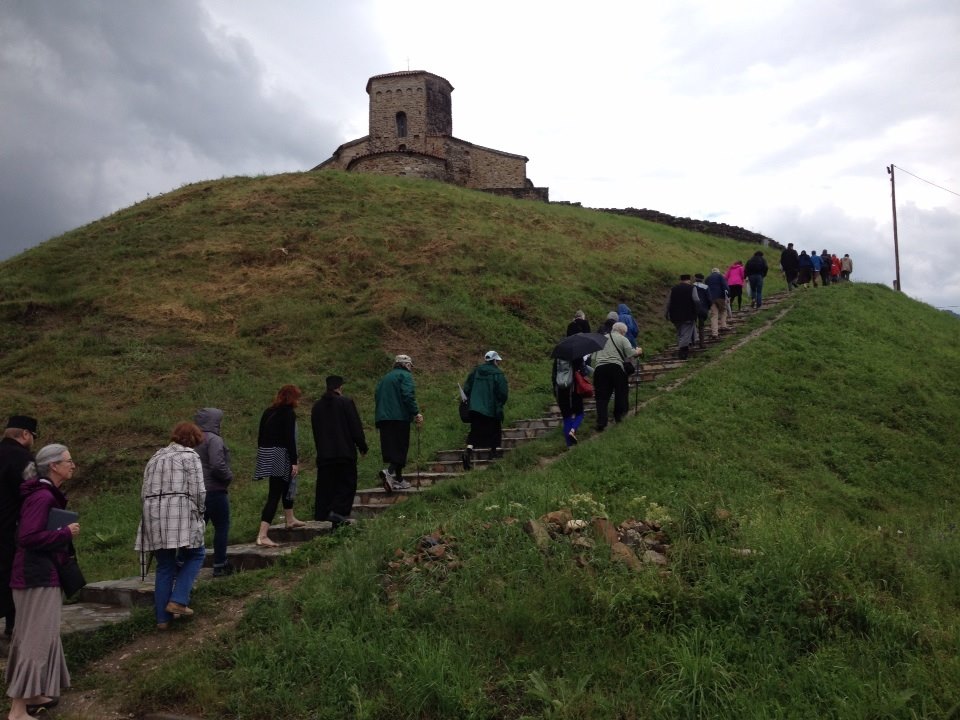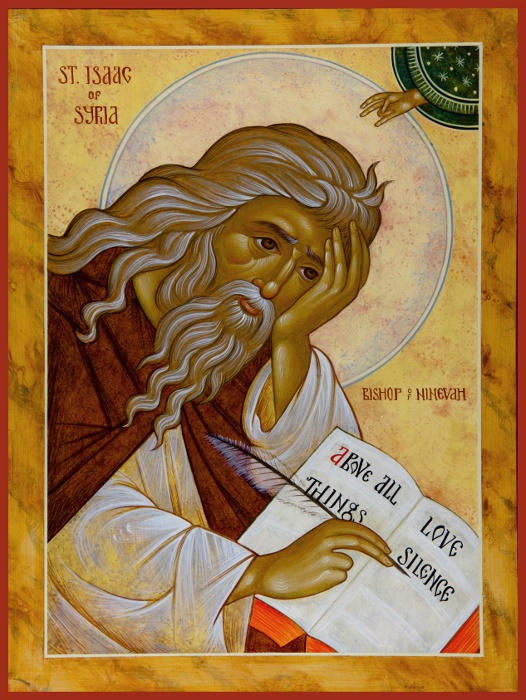Friday of the Ninth Week of Matthew
You can listen to an audio podcast of this post at https://www.spreaker.com/user/youngfaithradio/matt9fri
In today’s Gospel reading, the Lord Jesus Christ shows forth the wrath of God against the ungodly:
At that time, Jesus went into the temple of God, and cast out all them that sold and bought in the temple, and overthrew the tables of the moneychangers, and the seats of them that sold doves, And said unto them, It is written, My house shall be called the house of prayer; but ye have made it a den of thieves. And the blind and the lame came to him in the temple; and he healed them. And he left them, and went out of the city into Bethany; and he lodged there. Now in the morning as he returned into the city, he hungered. And when he saw a fig tree in the way, he came to it, and found nothing thereon, but leaves only, and said unto it, Let no fruit grow on thee henceforward for ever. And presently the fig tree withered away. And when the disciples saw it, they marvelled, saying, How soon is the fig tree withered away! – Matthew 21: 12-14, 17-20
The wrath of God is not a popular topic today, but the reality is unavoidable. Here the God-Man exercises the divine anger by thrashing those who defiled the Temple and by cursing the apostate Old Israel represented by the barren fig tree. Tough love indeed.
For a long time now, the enemies of our salvation, visible and invisible, have conducted an unceasing brainwashing campaign to make us believe that Christian love consists in accepting lies, condoning sins, and praising ugliness, and this brainwashing has destroyed family and society, for, of course, we must actively oppose evil, or evil will triumph. Militant, intransigent warfare against evil is the calling of the Church on earth. The Scriptures and Fathers have always taught this, and to deny it is to accept the heresy of pacifism, which claims to be a more spiritual kind of religion than Orthodoxy, but is in fact a religion of demonic false love.
The late Archbishop Averky of the Russian Orthodox Church Abroad (+1976) wrote clear, no-sense article on this subject of true love vs. fake love, and true forgiveness vs fake forgiveness of sins (see below). Here the holy archbishop states, “Resolutely struggling with every tiniest manifestation of evil and sin in our own souls, let us not be afraid to expose and rebuke evil everywhere it appears in modern life—not out of pride or vanity, but only out of love for the truth. Our main task in these evil times of lying shamelessness is to preserve whole our faithfulness and dedication to the authentic Gospel Truth and to the Author of our salvation—Christ the Life-Giver Who rose after three days from the grave, the Conqueror of hell and death.”
We cannot postpone speaking the truth until some imaginary day when we are perfect, passionless, hesychasts who never lose their temper and always say everything with perfect wisdom in a calm, quiet voice. The Church has never taught such a thing. Qui tacet consentire videtur – “He that is silent seems to give consent.” Let us not consent to evil by our silence, but speak the truth firmly with that true love that desires to please God and save souls.
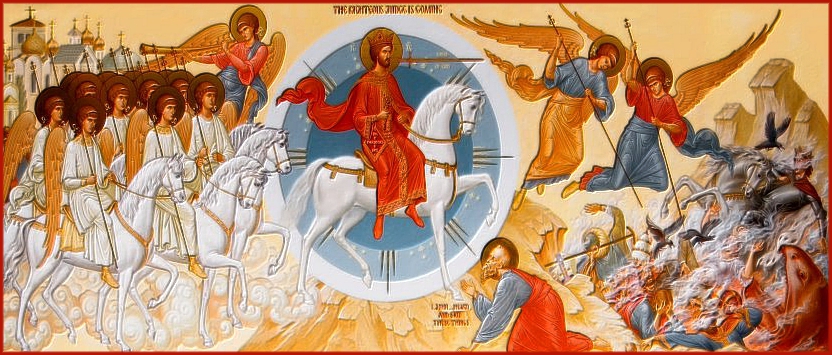
REMISSION OF SINS, AND FALSE CHRISTIAN LOVE AND FORGIVENESS
Source: https://orthochristian.com/119438.html
The following treatise by the ever-memorable Archbishop Averky (Taushev) (born November 1, 1906 in the city of Kazan, died: April 13, 1976 in Jordanville, New York) is part of a larger work entitled, The Christian in the Modern World (in Russian).
The future Archbishop Averky immigrated with his family in the wake of the Bolshevik revolution in Russia to Bulgaria, and there became a monk and a priest. Having witnessed the horrifying result of liberal ideology and apostasy in his homeland, his writings are startlingly relevant to us today.
One of the most important consequences of the great work of man’s redemption wrought by Christ the Life-Giver Who rose after three days from the dead, was precisely forgiveness, or the remission of sins.
And truly! One of the main consequences of the great work of man’s redemption, wrought by Christ the Life-Giver Who rose after three days from the dead, was precisely forgiveness, or the remission of sins.
This is why after appearing on the first day after His Resurrection to His disciples who were gathered together, the Risen Lord gave them peace; He breathed on them and said, Receive ye the Holy Ghost: Whose soever sins ye remit, they are remitted unto them; and whose soever sins ye retain, they are retained (Jn. 20:19–23).
Further in the Book of the Acts of the Apostles we see that in preaching Christ crucified and risen from the dead, the holy apostles immediately afterwards called their listeners to repentance and to receive baptism “unto the remission of sins”.
Repent, and be baptized every one of you in the name of Jesus Christ for the remission of sins, and ye shall receive the gift of the Holy Ghost (Acts 2:38)—that is what the apostle Peter said to the great crowd of people listening to him on the day of Pentecost.
Repent ye therefore, and be converted, that your sins may be blotted out (Acts 3:19), he and the holy apostle John called to the people gathered around them, after the their miraculous healing of a man who was lame from birth. God now commandeth all men every where to repent, said the apostle Paul to the Athenians in his famous sermon at the Areopagus, Because he hath appointed a day, in the which he will judge the world in righteousness (Acts 17:30–31).
From this it is clearly seen that this “forgiveness” about which St. John Chrysostom speaks, or, “remission of sins”, are given to us not unconditionally, but conditionally—that is, under the condition of repentance (sincere repentance, of course). Therefore, in giving His disciples the power to “remit sins” by the Holy Spirit, the Lord gave them at the same time, as we see, the power to not remit sins—obviously to those who do not really repent: whose soever sins ye retain, they are retained—which means that they are not forgiven.
How understandable this is, how logical and how completely opposite this clear and definite, pure Gospel teaching is to the propaganda so fashionable today of some pseudo-Christian love and unconditional all-forgiveness, just too all-encompassing, which supposedly extends even to the enemies of the Christian faith who actively war with the Church and faith in God itself and are undoubtedly the servants of the coming Antichrist!
In order to strengthen their shaky “position”, such false preachers of this trendy, pseudo-“Christianity” like very much to abuse the Lord’s famous saying, Judge not, that ye be not judged (Matt. 7:1). This is their very favorite saying, which nevertheless does not hinder them in the least from judging and condemning in the cruelest manner all of those who do not agree with their heresy, which is no more than a totally deceitful distortion of the Gospel teachings—a fraud by which they confuse and disturb many.
In order to correctly understand this saying of the Lord we have to remember that after all, our Lord Jesus Christ Himself Who said, Judge not, that ye be not judged, right afterwards taught: Give not that which is holy unto the dogs, neither cast ye your pearls before swine, lest they trample them under their feet, and turn again and rend you (Matt. 7:6).
Who are these “dogs” and “swine”?
By these “dogs” and “swine” the Lord means morally perverted people who are incapable of accepting the Gospel Truth, for whom everything sacred is alien and even repulsive, because they cannot understand its value. These are morally fallen, impious and evil people who often only mock the Gospel Truth, trample it under foot, and can treat the very preachers of it with fury, causing them various disasters and even death (see St. John Chrysostom, Explanation by Bishop Mikhail and others).
Isn’t it clear from this that by the words, “Judge not that ye not be judged” the Lord by no means forbid us from making a moral assessment of people—to discern the difference between good and evil people? And He not only does not forbid us, but as we shall see further, He even commands us to do so.
Thus, the Lord directly commands that we rebuke a sinning brother.
Moreover if thy brother shall trespass against thee, go and tell him his fault between thee and him alone: if he shall hear thee, thou hast gained thy brother… (Matt. 18:15).
And that is not all! Such a wise and Christian judgment is not only allowed to us concerning a sinning brother—we are even supposed to bring other brothers into it:
But if he will not hear thee, then take with thee one or two more, that in the mouth of two or three witnesses every word may be established (Matt. 18:16).
But that is still not all! If a brother continues to persist in the evil he is doing, then we need to “inform” the Church about it—that is, the ecclesiastical authorities, who have received from the Lord Himself the blessed right to “bind and to loose”:
And if he shall neglect to hear them, tell it unto the church: but if he neglect to hear the church, let him be unto thee as an heathen man and a publican (Matt. 18:17).
These last words are the most terrible and totally unacceptable to the perverted pseudo-Christian ideology of those modern propagandists of liberal, fashionable neo-Christianity, for they go completely against its basic principles.
But whether someone likes them or not, they cannot be stricken from the Gospels—after all, they are the words of our Lord Jesus Christ Himself.
How can we not take them into consideration?
But modern neo-Christians, among whose numbers are some learned theologians and many high ranking bishops, have no desire at all to be reconciled with the true, authentic Gospel of Christ, but instead self-willfully fabricate their own personal “gospel”, as their ideological predecessor Leo Tolstoy of dark memory did in his time.
Alas! For many modern, totally unstable “Christians” who are not firm in the true Christian faith, this is a great temptation and scandal that completely knocks them off the right path.
Judge not, that ye be not be judged!
How alluring this neo-Christian distorted explanation seems: “I will not stop you from sinning, and in return, don’t you stop me from sinning!”
This is the horrifying, perverted, criminal refraction of this sacred text, presented to us in our times!
But in fact, we should know and remember that there are different kinds of condemnation.
One condemnation is sinful, while another, as we have already seen, is not only not sinful but commanded of us by the Gospel itself.
And this is quite understandable, for if we never judge anyone under any circumstances we will soon loose all ability to discern good and evil, and we will easily be drawn onto the path of evil.
The greatest of those born of women, to whose sanctity and irreproachable moral heights Christ the Savior Himself testified, the Holy Forerunner of the Lord, John, when seeing the Pharisees and Sadducees approaching him said to them, O generation of vipers, who hath warned you to flee from the wrath to come? (Matt. 3:7).
What is this? Sinful condemnation?
Our Lord Jesus Christ Himself invited His followers to take their example from Him, saying, Learn of me; for I am meek and lowly in heart (Matt. 11:29); nevertheless, He used the same expression [as St. John the Forerunner used] with regard to sinners hardened in their evil, who did not want to hear His divine teaching: O generation of vipers; and He often addressed people around Him, especially the scribes and Pharisees, with very sharp words of condemnation: wicked and adulterous generation! (Matt. 12:39), O faithless and perverse generation, how long shall I be with you? how long shall I suffer you? (Matt. 17:17). He constantly called the Scribes and Pharisees “hypocrites”, “fools and blind”, “serpents” (Matt. 15:7, 16:3, 6–12; the whole of Chapter 23); He once called King Herod a “fox” (Lk. 13:32); He “upbraided”, as the Gospel itself says, whole cities: Chorazin, Bethsaida, and Capernaum because they “did not repent”. (Matt. 11:20–24).
More than that! We know from the Gospel that the meek and humble Lord Who prayed for His crucifiers, Lord forgive them, for they know not what they do (Lk. 23:34), not only used sharp words of condemnation but at times had recourse to very strong and decisive measures of physical action. Thus, twice—at the very beginning of His service in society, and second, at the very end of it—not long before His sufferings on the Cross cast the money changers out of the temple. The Evangelists tell us about these events vividly and graphically. Not able to abide the shameless commerce they conducted under the protection of the priests themselves and even with the participation of the high priests, who received great profits from the sale of doves, the Lord Jesus Christ came to the Jews in the Jerusalem Temple and made a scourge of small cords, He drove them all out of the temple, and the sheep, and the oxen; and poured out the changers’ money, and overthrew the tables, saying to the sellers, make not my Father’s house an house of merchandise (Jn. 2, 14–17). And after His triumphal entry into Jerusalem before His suffering He again entered the Temple and said, My house shall be called the house of prayer; but ye have made it a den of thieves (Matt. 21:12–13; Mk. 11:15-17; Lk. 19:45–46).
So, what is this?
And how far is this from that false Christian “love” and all-encompassing “all-forgiveness” that the modern liberals, the “neo-Christians” preach! And wouldn’t these people who are supposedly more “loving” than the Lord Himself find these words and actions of the Sinless Lord sinful and unacceptable, and contradictory to His own teaching? Wouldn’t they label them with their beloved expressions, such as “obscurantist”, “bigoted”, “dark medieval”, “retrograde”, “inquisition”, and such like?
But can we think that our Lord, the Incarnate Only-Begotten Son of God, Who came to earth for the sake of our salvation, for the sake of teaching us divine Truth and Life, would have contradicted in any way His own Self or acted against His own teaching?
Of course that is out of the question. That would be terrible blasphemy!
But that is what He did!
Following the example of the Lord Himself, His holy disciples and apostles were not afraid when necessary to “judge” people, stubbornly contradicting the Gospel Truth they were preaching, and had recourse at times to the most categorical measures in order to bridle and cut off evil.
Thus, Apostle Peter severely condemned Ananias and Sapphira for their cunning and punished them on the spot with death only because they “kept back the price of the land” that they had sold instead of giving it over completely as an offering to the Church (Acts 5:1–11).
Holy Protomartyr Archdeacon Stephen openly and publicly condemned his fellow Jews at the Sanhedrin, calling them “stiff-necked” and “uncircumcised in heart and ears,” accusing them of “always resisting the Holy Spirit,” that they “persecuted the prophets,” and finally became “betrayers and murderers” (Acts 7:51–52).
Holy Apostle Peter condemned Simon the Sorcerer for his attempts to purchase the grace of the Holy Spirit with money, saying to him, Thy money perish with thee… I perceive that thou art in the gall of bitterness, and in the bond of iniquity (Acts 8:18–23).
During his first missionary journey, the holy apostle Paul harshly condemned the sorcerer and false prophet Barjesus, or Elymas, who was trying to turn the proconsul Sergius Paulus away from Christ. The apostle said, O full of all subtilty and all mischief, thou child of the devil, thou enemy of all righteousness! and punished him with blindness (Acts 13:6–12).
What is this? Sinful judging? The apostles’ lack of Christian love?
When the newly converted Christians in Corinth informed the same apostle Paul that the repulsive and wicked sin of incest was being practiced amongst them, that one should have his father’s wife, he did not say to them, “Judge not, and ye shall not be judged!” or, “Why behold ye the splinter in your brother’s eye, but do not feel the beam in your own?” No! Nothing of the sort! The holy apostle immediately condemned that sinner and commanded the Corinthians to condemn him, pronouncing a very harsh sentence and punishment against him: To deliver such an one unto Satan for the destruction of the flesh, that the spirit may be saved in the day of the Lord Jesus (1 Cor. 5:9–13).
The passages from Holy Scripture we have cited above seem more than sufficient to show us how we have to correctly understand the Lord’s words, Judge not, that ye be not judged; to be persuaded that these words do not at all exclude every kind of condemnation of our neighbor; that is, “condemnation” is not only allowable but even necessary, prescribed by God’s Law itself and our conscience. This is because a true Christian cannot relate to barefaced evil and sin indifferently; he cannot refuse to notice it or reconcile himself with it under the cunning excuse of being “nonjudgmental”, having “Christian love”, and “all-forgiveness”.
We have to know well and remember that the malicious Tolstoyan teaching of “not resisting evil” is absolutely foreign to true Christianity (incidentally, that teaching destroyed our misfortunate homeland Russia and thrust it into the terrible horrors of Bolshevism!): Every true Christian is irreconcilable to evil, no matter where or in whom he finds it.
The holy apostles followed the example of the Lord Jesus Christ, and others after them warred against it, even at the cost of all possible and serious deprivations, even of their own lives.
That is how the holy martyrs warred with the evil of dark paganism and idol worship—not only passively dying in Christ’s Name, but also quite decisively condemning, at times with very sharp words and expressions and even actions, the errors and wickedness of the idol worshippers.
The holy fathers of the Church decisively and uncompromisingly fought against heretics, by no means considering the heretics to be people who “think differently” (as it has become fashionable in our time to express it!), to whom we have to show “tolerance”, and whom we have to “approach with understanding”, but to view them as grievous wolves … not sparing the flock, according to Holy Scripture (Act. 20:29), and sternly condemning them at the Ecumenical and Local Councils, the right-believing Christians being cautious of every association with them, and giving them over to anathema.
What is this? Sinful condemnation or a lack of love?
No! It is none other than the lawful application in life of the apostle’s words: What fellowship hath righteousness with unrighteousness? and what communion hath light with darkness? And what concord hath Christ with Belial? or what part hath he that believeth with an infidel? (2 Cor. 6:14-15).
And our venerable monastic fathers and mothers—Christian ascetics—“judged” this world which lieth in evil by the very fact of their departure from it. They followed the call of God’s Word: Wherefore come out from among them, and be ye separate, saith the Lord, and touch not the unclean thing; and I will receive you. And will be a Father unto you, and ye shall be my sons and daughters, saith the Lord Almighty (2 Cor. 6:17–18).
And now, in in these terrible times of cynical and openly fierce atheism, we as Christians faithful to Christ the Savior and His True Church cannot but condemn with all our resolve the atheists and blasphemers, the fierce theomachists who are striving to uproot the Christian faith throughout the world and destroy the Holy Church, defiling our Fatherland and desecrating our holy shrines.
We cannot but condemn also all those who cooperate with them, who support them and aid them in consolidating their power, helping them by this in their hellish plans.
We condemn the servants of the coming Antichrist and the Antichrist himself…
Could this really be sinful judgment that is forbidden by the Gospel, as the modern-day smarties—neo-Christians filled with some kind of “super love” and all-encompassing “all-forgiveness”—are trying to persuade us to think?
Let them not lie against the Lord and His Holy Gospel!
Let them not in their pharisaical pride and self-deception ascribe to themselves more love than the very Incarnation of Love, our Lord and Savior, had!
And how we need to correctly understand the Lord’s saying, Judge not that ye be not judged! The great father of the Church St. John Chrysostom explains this beautifully:
“Here the Savior is not commanding us to not judge all sins in general, and He does not forbid everyone without exception to do this, but only those who, themselves filled with numberless sins, reprove others for insignificant mistakes. Christ is pointing here also at the Jews who themselves being evil were the accusers of their neighbors over some unimportant and insignificant mistakes, while they themselves unconscionably committed great sins (see vol. VII, p. 260 [Russian]).
It follows that judgment is not forbidden about a neighbor, nor is it forbidden to condemn his evil actions in and of themselves, but forbidden rather is the evil feeling in the soul for one’s neighbors by a person who himself sins in the same way or even more, without thinking about his own correction.
It is not objective “judgment” of a neighbor that is forbidden, not dispassionate condemnation of his bad behavior, but evil gossip and calumny, which often comes from vain and impure impulses—from pride and ambition, envy or resentment.
In other words, forbidden is all anger and glee for personal reasons over one’s sinning neighbor, and by no means the just, pure, ideological, principled, and dispassionate evaluation of his actions and behavior. This is not only not contradictory to the Gospel and reprehensible, but to the contrary is even necessary, so that we would not end up indifferent to good and evil, and so that evil would not triumph in the world due to our indifference.
Therefore, those modern pastors, whom it would be better to call false pastors, commit a great crime by unconsciously or consciously teaching their flock the Tolstoyan “resisting not evil”.
What terrible, utter deceit!
What true pharisaical hypocrisy!
“To never judge anyone for anything”—such a disposition in modern Christian society is just what the servants of the coming Antichrist want to bring about, so that all would be simple and wide open for them to do their work of preparing a favorable atmosphere for the speedy enthronement of their “sovereign”.
Could it really be that in our time it is still not clear to every honest and conscious Christian that unconditional “all-forgiveness” is needed only by the enemy of Christ—the Antichrist—so that people would finally loose all feeling for discerning good and evil, that they would make peace with evil, readily accept it, and then accept the Antichrist himself without giving a thought to any struggle against him?
This is no more than the hypocritical pharisaical deceit of the enemy who thirsts for our destruction!
After all, if Christian all-forgiveness, given to us by the resurrected Christ the Savior, extended so to speak “automatically” also to those who do not wish to repent and correct their lives, then the Lord would not have given the apostles, and in their person to all their successors—the pastors of the Church—along with the power to “remit sins” the power also to “bind” them, and He would not have said to them when He appeared after His Resurrection, Whose soever sins ye remit, they are remitted unto them; and whose soever sins ye retain, they are retained (Jn. 20:23).
Indeed what outrageous and foolish audacity it is to consider yourself more loving than God Himself and to “correct” the Gospel of Christ, inventing your own “gospel”!
Let us make every effort to guard ourselves, brothers, from this evil leaven of modern phariseeism!
Resolutely struggling with every tiniest manifestation of evil and sin in our own souls, let us not be afraid to expose and rebuke evil everywhere it appears in modern life—not out of pride or vanity, but only out of love for the truth. Our main task in these evil times of lying shamelessness is to preserve whole our faithfulness and dedication to the authentic Gospel Truth and to the Author of our salvation—Christ the Life-Giver Who rose after three days from the grave, the Conqueror of hell and death.
If he neglect to hear the church, let him be unto thee as an heathen man and a publican (Matt. 18:17).
We have heard these terrible words of our Lord Jesus Christ Himself in the Gospel reading. We should always remember them, but first of all, we should correctly understand their sense and meaning.
What is this?
When the Lord bade farewell to His disciples at the Last Supper, to console them who were grieving over their imminent separation from their Divine Teacher He said: I will pray the Father, and he shall give you another Comforter, that he may abide with you for ever (Jn. 14:16), Howbeit when he, the Spirit of truth, is come, he will guide you into all truth (Jn. 16:13), The Comforter, which is the Holy Ghost, whom the Father will send in my name, he shall teach you all things, and bring all things to your remembrance, whatsoever I have said unto you (Jn. 14:26).
The Lord fulfilled His promise on the tenth day after His Ascension (or on the fiftieth day after the Resurrection). On the great and glorious day of Pentecost, the promised “Comforter”—the Holy Spirit—descended upon the apostles, and on earth appeared the Kingdom of God come with power (Mk. 9:1), about which the Lord spoke many times during His earthly life: it is the Church of Christ. The Lord earlier gave His Church a great promise: I will build my church; and the gates of hell shall not prevail against it (Matt. 16:18).
The Church of Christ is the Kingdom of the Spirit of God; it is the Treasury of the grace of the Holy Spirit, and it is also the Treasury of Divine Truth, because the Holy Spirit, in the words of Christ the Savior Himself, is the “Spirit of Truth”. That is why the great apostle of the nations Paul wrote to his disciple Timothy: the church of the living God, the pillar and ground of the truth (Jn. 18:37).
The Church of Christ is filled to abundance with Divine Truth, and in it is only Truth. There can be no untruth in it, no lie, for it preserves the teaching of Christ Who is the Truth, as the Lord Himself said at Pilate’s judgment seat: To this end was I born, and for this cause came I into the world, that I should bear witness unto the truth. Every one that is of the truth heareth my voice (Jn. 18:37).
When the Lord Jesus Christ said, if he neglect to hear the church, let him be unto thee as an heathen man and a publican (Matt. 18:17), He of course meant the true Church—the Church that sacredly and unshakably preserves intact and undistorted the pure teaching of Christ, and which is completely foreign to any lie or untruth no matter what kind. Every lie and untruth is completely incompatible with the true Church of Christ, for lies are from the devil, as the Lord clearly said to the Jews who stubbornly resisted believing in Him: Ye are of your father the devil, and the lusts of your father ye will do. He was a murderer from the beginning, and abode not in the truth, because there is no truth in him. When he speaketh a lie, he speaketh of his own: for he is a liar, and the father of it (Jn. 8:44).
And truly, homicide and lies are closely bound to each other: Homicide leads to lies, and lies often lead to homicide. Both of them come from the devil and therefore they cannot have any place in the true Church.
We should evaluate everything that is happening in the world from this point of view!
Archbishop Averky (Taushev)
Translation by Nun Cornelia (Rees)
Original Russian text from Azbyka.ru

